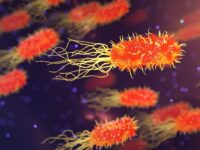The human body is an incredibly complex network of cells and efficient pathways. This network constantly adjusts to maintain homeostasis during life changes — with pregnancy as one of the most drastic. So, what happens when a body must sustain a fetus over nine months? How can an embryo with foreign antibodies develop inside the body? During pregnancy, female bodies undergo exceptional changes to acquire fetomaternal tolerance — an active, yet unresponsive reaction to specific antigens on the embryo. This immune tolerance has prompted several medical studies and developments that could improve organ transplant success rates, understanding of tumor persistence in cancer, and autoimmune disease treatment.
During pregnancy, female bodies undergo exceptional changes to acquire fetomaternal tolerance — an active, yet unresponsive reaction to specific antigens on the embryo.
The placenta functions as a vital intermediate structure between the mother and her offspring, serving as the lifeline for the developing fetus. After fertilization, the zygote begins cell replication and leaves the fallopian tube to mature into a blastocyst. If the blastocyst implants, the placenta attaches to the uterine wall. The umbilical cord connects the placenta to the developing fetus, delivering nutrients and oxygen and removing toxic waste products. These components are essential; improper function, implantation, or detachment of the placenta can result in several complications like preeclampsia, gestational diabetes, miscarriages, and stillbirths.
Embryonic tissues and the placenta are semi-allogeneic, meaning they contain cells that don’t entirely genetically match the mother. This prompts the question: how does this foreign tissue grow inside of another human and surpass the mother’s immunological barriers? Normally, genetic variation between organisms results in different antibody expressions. When disparate antibodies are encountered by immune system cells, a response occurs through a cascade of protein signaling pathways that lead to the production of immune cells. As a part of the innate immune response, natural killer cells, a subset of immune system T cells, are responsible for attacking foreign tissues on mucus-lined membranes inside the body, like the uterine wall. However, when the semi-allogeneic blastocyst implants into the uterine lining, maternal-fetal rejection of the embryo doesn’t occur.
Interestingly, uterine natural killer (uNK) cells are still present within the uterus throughout pregnancy and act as immune protectors to maintain a microenvironment that supports fetal development. UNK cells support embryonic growth by causing initial inflammation in the uterine lining vital for implantation. Afterward, uNK cells do not attack the semi-allogeneic placenta or embryo.
Survival of the semi-allogeneic placenta and maturing embryo is a consequence of T cell and uNK cell inactivity in the embryo and structure surrounding the placenta.
Recent studies on pregnant mice by researchers at New York University Langone Medical Center reveal how the female immune system adapts to obtain fetomaternal tolerance while still protecting the mother and the embryo. They discovered that survival of the semi-allogeneic placenta and maturing embryo is a consequence of T cell and uNK cell inactivity in the embryo and structure surrounding the placenta. To prevent the action of these immune cells, the chemokine genes that activate uNK cells and T cells are disabled at the onset of pregnancy. Foreign antibodies from the fetus and placenta are responsible for altering the expression of chemokine genes in the decidua. Also known as epigenetic modification, the deactivation of chemokine genes in the decidua prevents the production of T cells and uNK cells, creating a safety zone for the semi-allogeneic placenta and fetus. Therefore, the mother can sustain the fetus without an immune system attack.
Beyond understanding how fetomaternal tolerance works, this research has many applications. Maternal immune tolerance research can provide insight into tumor growth and survival, improve cancer and autoimmune disease treatment, and boost organ transplantation success rate. Using the findings from the mice study, Jessica Weaver and her team at Arizona State University are making huge strides towards improving health using immune biomedical technology. Weaver and her team are developing a vaccine using the science of fetomaternal tolerance to eliminate the need for prescribed immunosuppressive drugs for organ transplant patients. The vaccine would alter immune response and prevent the body from attacking a foreign organ. Nevertheless, complications in pregnancy-related to failures in fetomaternal tolerance or embryonic damage raise concerns regarding the efficacy of this potential medical technology. Pregnancy loss related to failures in the maternal immune response stirs debate about relying on fetomaternal tolerance science for the vaccine.
Maternal immune tolerance research can provide insight into tumor growth and survival, improve cancer and autoimmune disease
Ultimately, further research to better understand fetomaternal tolerance and why it is not always successful could improve pregnancy success rates and support studies for autoimmune diseases, cancer treatment, and organ transplants. As new research emerges about fetomaternal tolerance, the scope of biomedical immune technology expands beyond supporting new life, additionally facilitating the design of novel treatments and innovative medical techniques.
International Journal of Developmental Biology (2014). DOI: 10.1387/ijdb.140109ss
Science (2012). DOI: 10.1125/Science.1220030



